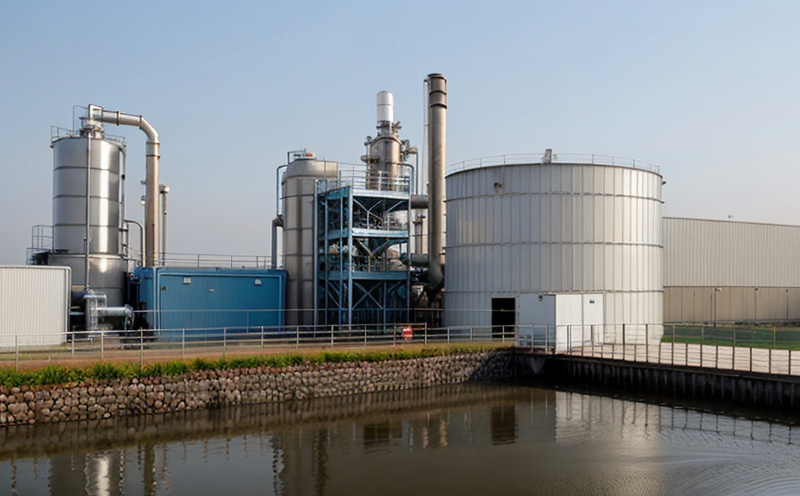ISO 9308 Microbiological Testing of Industrial Water
The ISO 9308 standard provides a robust framework for microbiological testing in industrial water systems. This method is particularly crucial for ensuring the safety and reliability of water used in manufacturing processes, where contamination can lead to significant operational disruptions or even compromise product quality.
Water used in various stages of manufacturing, from cooling systems to process water, must meet stringent standards to avoid biofouling, corrosion, and potential health hazards. Microbiological testing under ISO 9308 helps identify the presence of microorganisms such as bacteria, fungi, and protozoa that could adversely affect these processes.
The standard outlines specific procedures for sample collection, preparation, and analysis using quantitative methods like membrane filtration or direct plating. These techniques are designed to detect and enumerate viable microorganisms in water samples accurately. Compliance with ISO 9308 ensures that industrial facilities adhere to best practices recommended by industry experts and regulatory bodies.
The significance of microbiological testing extends beyond mere compliance; it plays a pivotal role in maintaining the integrity of manufacturing processes, enhancing product quality, and safeguarding employee health. By adhering to this standard, companies can mitigate risks associated with waterborne pathogens and optimize their operational efficiency.
For industrial facilities, regular monitoring through ISO 9308 testing is essential for identifying potential issues early, allowing for timely corrective actions. This proactive approach not only prevents costly shutdowns but also contributes to a safer working environment.
- Sample Collection: Proper collection methods ensure accurate representation of the water sample.
- Preparation: Standard procedures prevent contamination and maintain sample integrity.
- Analysis: Quantitative results provide actionable insights for process optimization.
The expertise required to perform these tests accurately is critical, as slight deviations in methodology can lead to misleading results. Our laboratory adheres strictly to the guidelines set forth by ISO 9308, ensuring reliable and consistent data that you can trust.
In conclusion, incorporating ISO 9308 microbiological testing into your quality assurance protocols is a strategic investment in process reliability and safety. By leveraging this standard, industrial facilities can maintain optimal water quality, enhance operational efficiency, and comply with international best practices.
Why Choose This Test
- Comprehensive Compliance: Ensures adherence to international standards and regulatory requirements.
- Rigorous Methodology: Utilizes proven quantitative methods for accurate microbiological analysis.
- Expertise: Our team of experienced scientists delivers reliable, consistent results.
- Prompt Reporting: Quick turnaround times to support timely decision-making.
- Confidence in Results: Consistent with industry best practices and regulatory expectations.
- Supporting Decision-Making: Provides critical data for process optimization and safety assurance.
The ISO 9308 test is essential for industrial water systems as it offers a structured approach to microbiological analysis. By choosing this service, you are investing in the reliability and safety of your manufacturing processes.
International Acceptance and Recognition
The ISO 9308 standard is widely recognized across various sectors for its robustness and applicability to industrial water systems. It has been adopted by numerous industries, including pharmaceuticals, electronics, and food processing, due to its comprehensive approach in identifying microbial contaminants.
International bodies such as the World Health Organization (WHO) recommend ISO 9308 standards for their reliability and effectiveness in ensuring safe water practices. By adhering to this standard, industrial facilities can align with global best practices, enhancing their reputation among international clients and partners.
The widespread acceptance of ISO 9308 is further underscored by its inclusion in regulatory frameworks such as those established by the US Environmental Protection Agency (EPA) and European Union directives. Compliance with these standards not only ensures legal adherence but also demonstrates a commitment to sustainable practices and environmental stewardship.
Our laboratory’s proficiency in ISO 9308 testing is bolstered by our rigorous training programs and continuous quality assurance measures, ensuring that we meet the highest international standards. By choosing this service, you are partnering with an institution recognized for its expertise and reliability in microbiological analysis.
Environmental and Sustainability Contributions
The ISO 9308 standard plays a vital role in promoting environmental sustainability by ensuring that industrial water systems operate efficiently without compromising water quality. By identifying and managing microbial contamination, this test helps prevent biofouling, which can lead to significant operational inefficiencies.
Moreover, the use of quantitative methods like membrane filtration ensures precise measurements, allowing facilities to monitor changes in microbiological levels over time. This data-driven approach supports informed decisions that contribute to sustainable practices and reduced environmental impact.
The ISO 9308 standard also emphasizes the importance of minimizing the release of contaminants into water systems, which is crucial for maintaining ecological balance. By adhering to this standard, industrial facilities can play a proactive role in protecting local ecosystems and promoting responsible resource management.
Our laboratory’s commitment to environmental sustainability is reflected in our use of energy-efficient equipment and sustainable practices within our operations. By choosing ISO 9308 microbiological testing, you are supporting an initiative that aligns with broader global efforts towards a more sustainable future.





